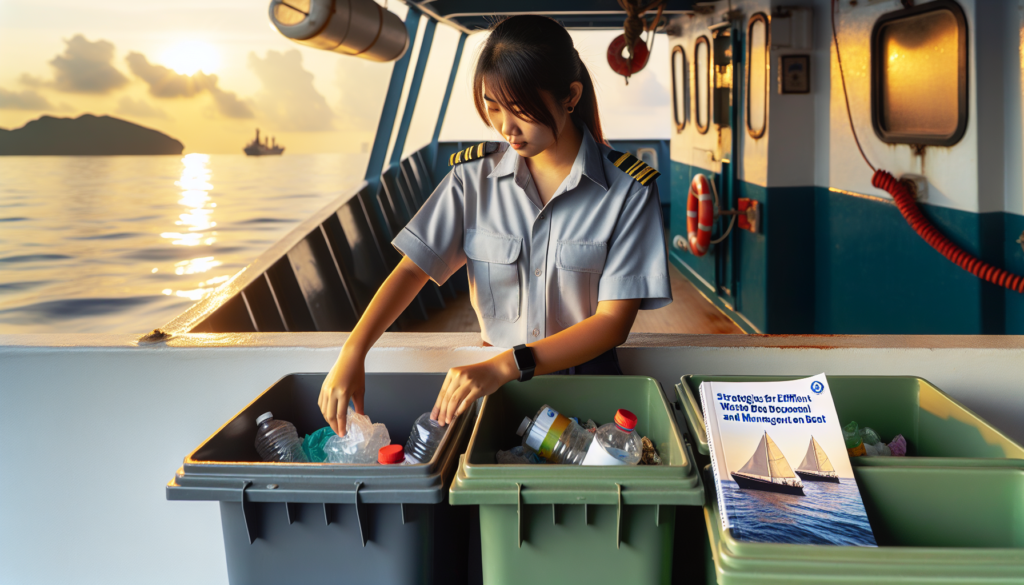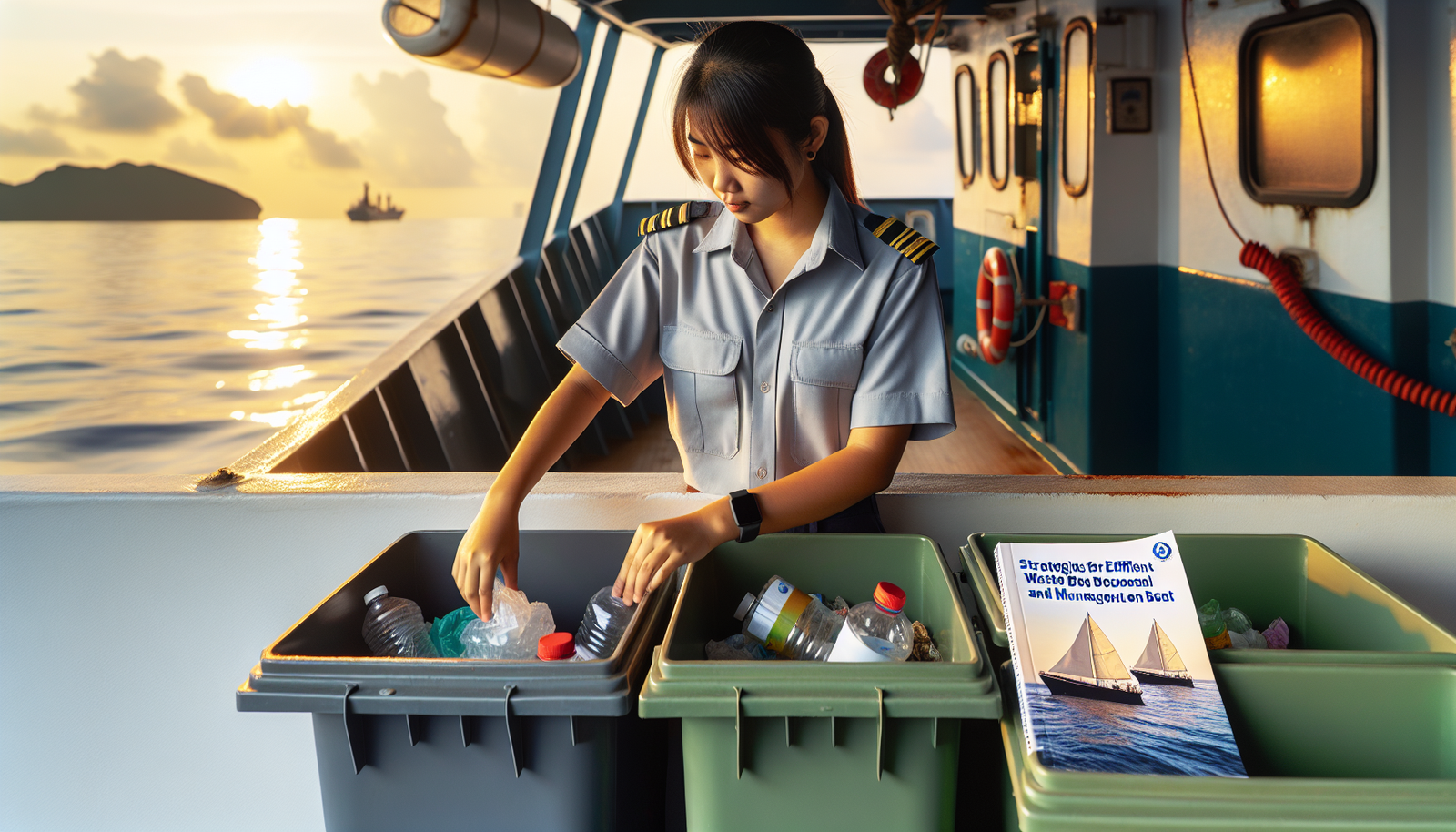Imagine, your boat slicing through the waves, the salty sea air filling your nostrils – a picture of absolute freedom. But this freedom comes with certain responsibilities, primary among them being maintaining the integrity of the marine ecosystem. It’s not just a question of cleanliness, it’s a matter of sustainability. Thus, understanding the art of competent waste management onboard your boat is paramount, a skill set that affects everyone out there in the open water. “How To Properly Dispose Of Waste On Your Boat” serves as your navigator through this vital process of sustainability, gently nudging you towards best practices and strategies in boat waste disposal, charting the course for a cleaner, greener boating experience. But remember, it’s not only about knowing how to do it, it’s about embracing the why behind it that truly matters.

Understanding Boating Waste Management
The ideal way to understand boating waste management is to first acknowledge the types of waste generated on boats and the steps to properly dispose of them. Waste generation on boats is inevitable, but its after-effects can be minimized. Let’s dive right into its various aspects.
Types of Waste Generated On a Boat
There’s a surprising variety of waste that you’ll find yourself dealing with while on a boating trip. It ranges from solid waste like food scraps, fish waste, plastics, glass, and metals to hazardous materials like oil, fuel, battery acid, antifreeze, and cleaning chemicals. Not to forget the potentially large quantities of sewage waste generated onboard.
Environmental Impact of Improper Waste Disposal
It’s easy to cast off waste into the blue yonder without thinking twice about it. However, improper waste disposal has severe environmental consequences. It can lead to contamination of water resources, harm marine life, and contribute to pollution. It impacts the ecosystem significantly, making it important for us to dispose of boat waste responsibly.
Legislation and Regulations Govervning Waste Disposal in Waters
Of course, many jurisdictions recognize the potential harm of improper waste disposal and have enforceable laws in place. Laws like the Federal Water Pollution Control Act in the U.S., for instance, lay down regulations governing waste disposal in public waters. Being familiar with such legislation not only saves you from potential legal repercussions but also contributes to a cleaner environment.
Planning for Waste Management
Planning your waste management should always be a part of preparing for any boating trip. Keep in mind the estimated waste generation, the need to minimize waste, and the essential equipment for waste management.
Estimating Waste Generation Based on Trip Length and Occupancy
Waste generation primarily depends on the length of your trip and the number of people on board. The longer the voyage and the more people involved, the more waste is created. Optimizing your planning according to these factors can considerably reduce waste buildup.
Provisioning Wisely to Minimize Waste
One way to reduce waste generation is by provisioning wisely. Choosing products with minimal packaging, avoiding disposable products, and pre-preparing food can easily lessen the quantity of waste produced.
Choosing the Right Waste Management Equipment for Your Boat
Having the necessary waste management tools on board, such as waste bins, recycling bins, waste compactors, and marine sanitation devices, is crucial in managing the waste generated.
Disposal of Solid Waste
After accumulating, solid waste needs to be properly disposed of. The focus should be on managing non-biodegradable waste, promoting recycling, and using designated facilities.
Managing Non-Biodegradable Waste
Non-biodegradable waste like plastic, metal, and glass require proper disposal as they don’t decompose naturally. They should be stored until you can dispose of them at designated onshore facilities.
Recycling Where Possible
Recycling options for certain types of waste materials such as glass, cardboard, paper, metal, and certain plastics, can significantly reduce the burden on the environment. Keep separate containers for recyclable items.
Use of designated Waste Disposal Facilities at Marinas
Marinas often provide designated waste disposal facilities. Use them to get rid of your waste responsibly and appropriately, thus reducing your environmental footprint.
Disposal of Organic Waste
Organic waste like food scraps and fish waste demand careful handling. This can involve responsible disposal, composting, or special dealing measures.
Appropriate Disposal of Food Scraps
Food scraps should not be disposed of haphazardly, but rather according to the regulations of your local area. If allowed, they may be thrown overboard but well away from shore and in deep waters.
Composting On Boats: Pros and Cons
Composting on boats can be a viable option where it results in a significant reduction in organic waste. But it requires careful management to prevent odors and pests. It also demands the right composting equipment.
Dealing with Fish Waste and Bait
Fish waste should preferably be handled in open ocean waters where it is allowed to fall back into the natural ecosystem. Live bait should never be released into the water, as they can disturb local ecosystems.

Dealing with Sanitation and Sewage Waste
Proper sanitation onboard is of utmost importance for a healthy and comfortable boating experience. A proper sanitation device, the right toilet, and efficient pumping out procedures are the keystones.
Importance of Marine Sanitation Devices
Marine Sanitation Devices (MSD) treat sewage to make it safe for disposal. Using them enables you to uphold standards of hygiene and abide by the law.
Choosing the Right Marine Toilet
The right toilet system plays a critical role in the disposal of human waste. Choices range from simple portable toilets to complex treatment systems. Your selection must be based on your boat’s size and your personal needs.
Pumping Out: A Step-By-Step Guide
Pumping out involves emptying your boat’s holding tank responsibly. Regular and efficient pumping out will keep your boat clean and odor-free, while also preventing pollution of water bodies.
Handling of Hazardous Materials
Hazardous substances onboard pose significant threats to safety and the environment. They require appropriate storage and disposal procedures.
Common Hazardous Materials on Boats
The common hazardous materials on boats include oils, fuels, antifreeze fluids, cleaning chemicals, batteries and their acids. They require specific handling procedures.
Storage and Disposal of Flammable Items
Flammable items pose significant safety risks and should be stored in a secure, well-ventilated area, away from sparks and heat sources. They should be disposed of at designated facilities.
Dealing with Battery Acid and Antifreeze
Battery acid and antifreeze are harmful both to humans and the environment. They should be stored in leak-proof containers and never discarded into the water but rather at proper hazardous waste disposal sites.
Oil and Fuel Management
Oil and fuel management on a boat involves preventing spills, regular maintenance to avoid leakage, and proper disposal of used oil and filters.
Preventing Oil and Fuel Spills
Preventing spills is the first step in oil and fuel management. This can be achieved by careful refueling, using oil absorbent materials and keeping a watchful eye for potential leaks.
Regular Maintenance to Avoid Leakage
Regular maintenance of the engine and other equipment minimises the risk of oil or fuel leakage.
Proper Disposal of Used Oil and Filters
Used oil and filters should be disposed of at a designated oil disposal facility where it gets recycled or safely discarded.
Creating a Boat Cleaning Regime
A strategic boat cleaning regime using eco-friendly products can help reduce additional waste generation and pollution.
Choosing Eco-friendly Cleaning Products
Eco-friendly cleaning products contain less harmful substances and thus, are a better choice for the environment. They also reduce the risk of you releasing harmful substances into the water bodies.
Avoiding Direct Discharge of Greywater
Greywater contains many harmful substances and should not be released directly into water bodies. Where possible, try to retain it for dumping at shore-based facilities.
Maintenance Techniques to Reduce Waste
Regular boat maintenance can avoid the need for more drastic cleaning measures and hence, reduce waste. Also, choosing durable, reusable products over disposable ones can help reduce waste.
Education and Awareness
Educating crew members and passengers about proper waste disposal procedures is crucial, as is displaying this information visibly.
Importance of Educating Crew Members and Passengers
Everyone on board should be aware of the importance and methods of waste disposal. This ensures they all help to minimize waste and dispose of it responsibly.
Displaying Information About Waste Disposal Procedures
Displaying information about waste disposal procedures onboard serves as a constant reminder to everyone. Plus, it introduces anyone new to the procedures.
The Role of Skippers and Boat Owners
Boat owners and skippers have a major role in maintaining a responsible waste management system. They need to educate, enforce regulations, and lead by example.
Emergency Situations
Emergencies can occur anywhere, anytime. Being prepared for potential waste disposal emergencies is just as important.
Preparing for Potential Waste Disposal Emergencies
Emergencies can lead to substantial waste generation or accidental spills. Preparing for them involves having an emergency action plan, necessary equipment, and knowledge of appropriate reactions.
Reporting Spills and Other Incidents
In case of spills or accidents, it’s imperative to report to the relevant authorities. Not only is it often legally required, but it also enables appropriate cleanup procedures to be initiated as early as possible.
Clean-Up Procedures After Accidents
Cleaning up after accidents is crucial in minimizing environmental impact. Depending on the magnitude of the accident, clean-up may require professional help. Following accidents, ensure to review your procedures to identify areas needing improvement.
Proper disposal of waste is essential for the well-being of our aquatic environment. Whether you are at sea for a day or a year, integrating diligent waste management into your boating routine will help to maintain healthier, cleaner waterways for all to enjoy.

